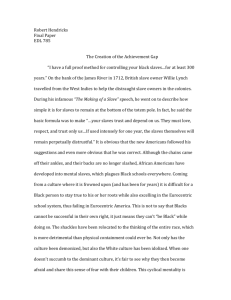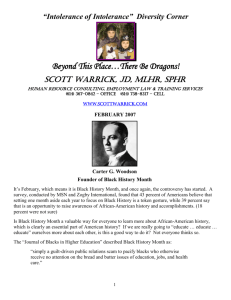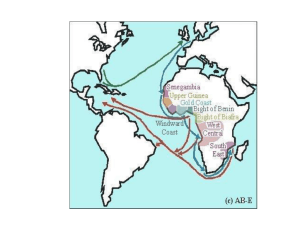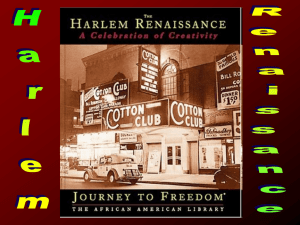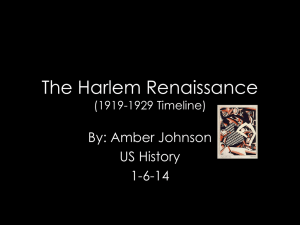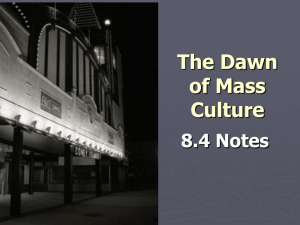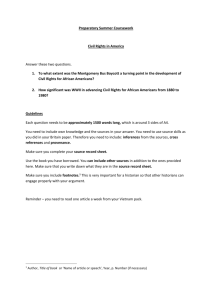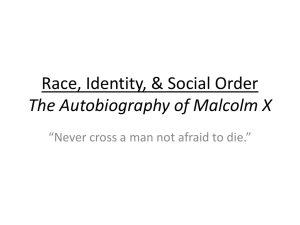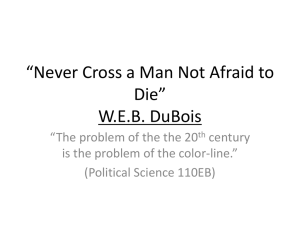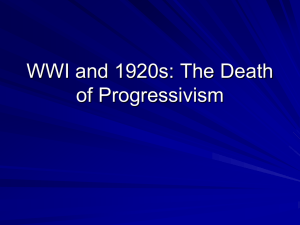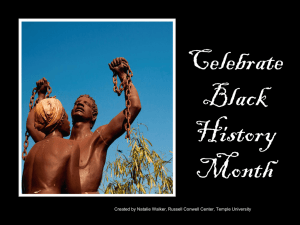1916 Establishes the Journal of Negro History.
advertisement
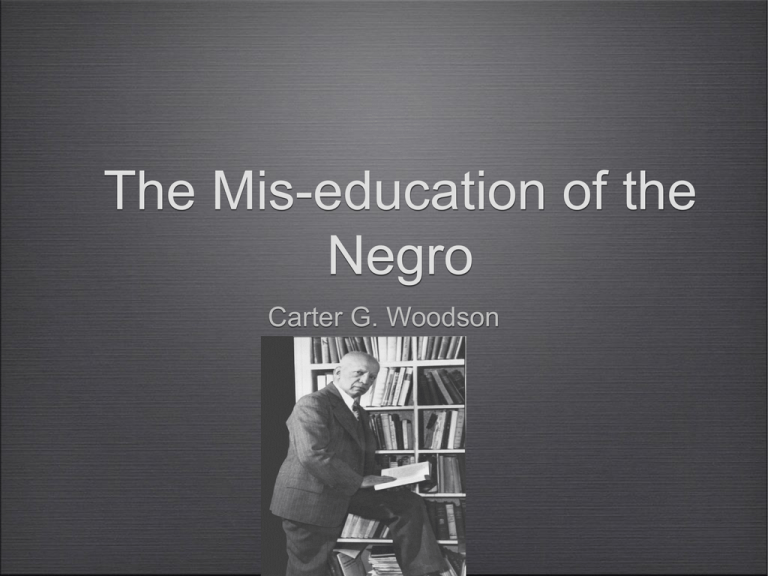
The Mis-education of the Negro Carter G. Woodson The Father of Black History The Man • Born 1875 in New Canton, VA to Anne and James Henry Woodson, former slaves. Woodson. was the first Black of enslaved parents to earn a PhD. • 1895-Enrolls in Douglass High School, finishes in two years. • 1897-1898 Studies at Berea College in KY • Attends Lincoln University and completes one year of undergrad • 1900-03 Attends the University of Chicago during the summer, completes his degree by correspondence course in 1908. • *After being admitted to the U of C Woodson is told that he is deficient in the general course requirements, but they accept his work from Berea anyway. • Earns B.A. from U of C in 1908 and an M.A. from there in August of the same year. Both degrees are in history with an emphasis on European History. • Earns a PhD from Harvard in 1912, joins the NAACP that year as well. • Seeks membership into the Washington D.C. Harvard Club but his membership is cancelled once they learn that he is Black. • 1915 Organizes the Association for the Study of Negro Life and History in Chicago. • 1915 Accepts invitation to speak at Tuskegee from BTW. The Man cont’d • 1916 Establishes the Journal of Negro History. • 1918 Meets with W.E.B. Du Bois to discuss NAACP plans to publish work on Black participation in the Civil War. • 1920 Serves as Dean of the College of Liberal Arts at Howard University, but is soon terminated after disagreeing with its white president. • 1923 Invites Du Bois to speak at ASNLH. • 1926 Establishes Negro History week in February. • 1931-32 Begins to publish criticism about the failings of historically Black colleges’ and universities’ approach to teaching liberal arts and sciences. • 1933 Publishes The Miseducation of the Negro. • Continues to publish and research Black history until his sudden death of a heart attack in 1950. “The Seat of the Trouble” • “Highly educated” or educated Blacks are contributing to the miseducation of the Negro by buying into the idea that we have contributed nothing to human civilization. • “...Negroes are taught to admire the Hebrew, the Greek the Latin and the Teuton and to despise the African” (1). • “The education of the Negroes, then, the most important thing in the uplift of the Negroes, is almost entirely in the hands of those who have enslaved them and now segregate them” (22). • “The present system under the control of the whites trains the Negro to be white and at the same time convinces him of the impropriety or the impossibility of his becoming white” (23). Overview of Woodson’s Thesis • The mis-education of postReconstruction Blacks consists of several key elements: • Blacks were taught to hate themselves and to think of themselves as inferior to other races. • Blacks educated in the U.S. did not learn any marketable skills so that they could support themselves. • Highly educated blacks tended toward corruption in politics and the church (when they were allowed in at all). • Highly educated blacks had no desire to help uplift the masses. • Although Woodson does not state this explicitly, I would argue that he might also see slavery as a system of education. “The Failure to Learn to Make a Living” • Woodson’s biggest issue is the failure of a college education to provide its graduates with marketable skills: • “The greatest indictment of such education as Negroes have received, however, is that they have thereby learned little as to making a living, the first essential in civilization” (38). • Thinking about the current state of higher education in the U.S. and our conversation last week, has anything changed? And could we apply this across the board to anyone who receives a college degree, not just Black folks? Politics, the Church, and why un-educated Negroes are getting it right • Woodson takes up the issue of Reconstruction, accusing (and rightly so) historians of rewriting history in defense of slavery as a means to keep Black out of political processes. He discusses how Blacks were kept from voting or even discussing politics. (p. 85-89). • He accused educated Blacks of abandoning their brethren in favor of the pursuit of more materialistic aims. Woodson was especially incensed at those who left traditional Black churches. “How an ‘educated Negro’ can thus leave the church of his people and accept such jimcrowism has always been a puzzle...It may be a sort of slave psychology which causes this preference for the leadership of the oppressor” (55). • “The ‘uneducated’ Negro business man, however, is actually at work doing the very thing which the ‘mis-educated’ Negro has been taught to believe cannot be done” (44). • Woodson relates several examples of uneducated Blacks who are doing well in business, the woman who bakes sweet potato biscuits, the woman who serves the chicken boxes, and others. On Reconstruction, or the re-education of the negro • “The program for the uplift of the Negro in this country must be based upon a scientific study of the Negro from within to develop in him the power to do for himself what his oppressors will never elevate him to the level of others” (144). • “The Negro teacher, then, must treat the disease rather than its symptoms” (145). • Woodson is really invested in re-imagining the Black church (sans sectionalism) in order to aid in the re-educating of Black folk. “Negroes should forget their differences and in the strengths of a united church bring out a new interpretation of Christ into this willing world” (147). • He sees HBIs as engaged in this process of re-education as well: “We should not close any accredited Negro colleges or universities, but we should reconstruct the whole system” (149). • English and composition are paramount (yay!) but with a focus on African folklore, philosophy, proverbs, languages, and literature instead of white western classical literature and languages. On Reconstruction, or the re-education of the negro • Woodson is most interested in Blacks learning their own histories, indeed, his program of education includes “studying also the history of races and nations which have been purposely ignored” (154). • Vocational education should include the development of new technologies as the current (early 20th century) programs were inadequate in light of the industrialization of the nation. • Lawyers, doctors, and other professionals should be working in the service of the Black masses, and lawyers in particular have a duty to interrogate racism and the ways in which Blacks have been misrepresented in the courts. Doctors are urged to work to advocate for improving the conditions in which Blacks live, and thereby improving their health as well. • Blacks are urged to use their political power judiciously: “Any people who will vote the same way for three generations without thereby obtaining results ought to be ignored and disfranchised” (183). Same $hit, Different day, Or the miseducation of 21st Century Negroes: Questions for Discussion • A few matters of concern: • Woodson seems to be rather essentialist. For example, he states: • “The negro is a gifted singer” (78); and “We scarcely realize what a poor showing we make in dramatics in spite of our natural aptitude in this sphere” (80). • “The unusual gifts of the race have not thereby been developed, and and unwilling world, therefore, continues to wonder what the Negro is good for” (7) • Has this bitten black folk in the behind in the behind in the same fashion that BTW’s five fingers speech did? How do current and previous trends in American culture figure in his assertion that Blacks have “natural” abilities in certain areas, such as sports? How has this contributed to the mis-education of 21st century Blacks? • Woodson does not account for human agency in this text at all. In fact, he claims that blacks don’t know any better and will always do as they are told if they are not reeducated. Is there any way to reconcile agency with the notion of miseducation? I’m thinking about his indictment of the black bourgeoisie's (the Talented Tenth’s) neglect of the masses. • What, if anything, has changed in regards to the education of Black folk in the U.S education system?
